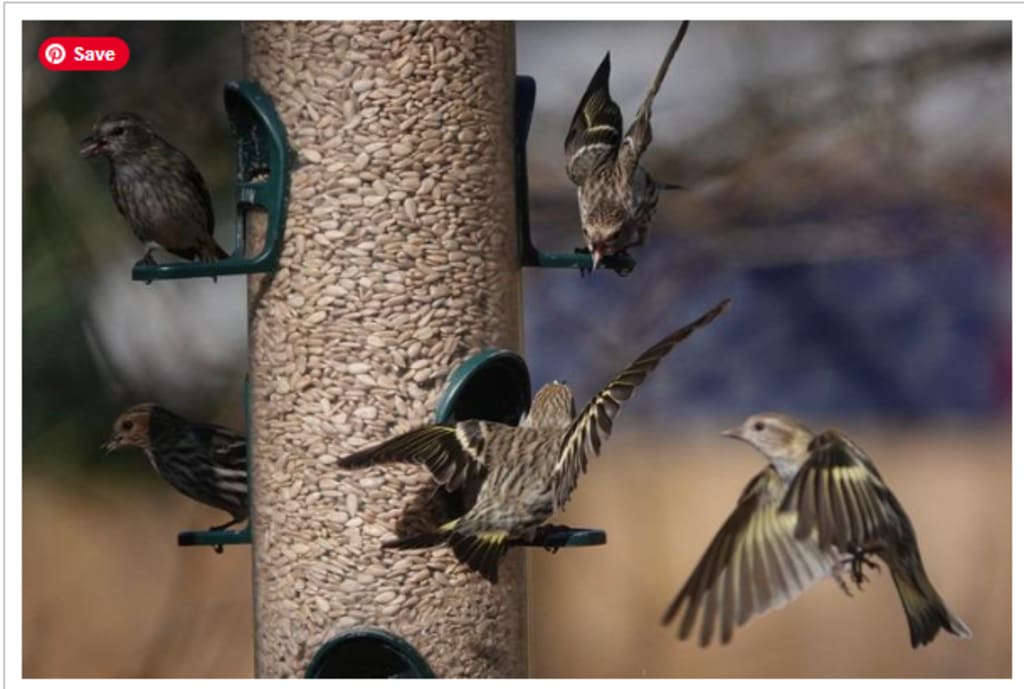Humans may have something to chirp about when they feed birds.
A group of scientists from Virginia Tech and other universities is attempting to gain a better understanding of the connection between feeding birds and people's health.

Ashley Dayer wants to dispel the myth that bird food is only meant for birds. Dayer, an associate professor in Virginia Tech's Department of Fish and Wildlife Conservation, is the primary author of a piece that was published in People and Nature. In it, she makes the case that public guidelines and policy should take into account the activity's benefits to humans in addition to acknowledging them.
Dayer stated, "When making decisions about bird feeding management, wildlife agencies, and others should take into account not only the scientific data of bird behavior but also the scientific data of human behavior."
The paper also calls for more research to clarify the effects of feeding birds on human health, and Dayer and a group of researchers from Virginia Tech and elsewhere are spearheading this effort. The team is working on what may be the first extensive study on bird feeding that also includes human observation.
According to Dayer, "People are reporting not just what they see at their bird feeders, but also their emotional responses to it." "We can now look at the human piece of it, which makes it pretty fun because most citizen science projects only focus on the natural or physical science."
The four-year project, recently funded as part of a more than $1.5 million National Science Foundation grant led by Dayer and biological sciences professor Dana Hawley, intends to involve over 10,000 bird feeders nationwide.
Additional partners on the project and article include
Christy Pototsky is a graduate student at Virginia Tech who studies the conservation of fish and wildlife.
Associate Professor Richard Hall of the University of Georgia
Ohio State University associate professor Alia Dietsch
Wesley Hochachka, Emma Greig, David Bonter, and Tina Phillips from the Cornell Lab of Ornithology
According to Dayer, state agencies' recommendations for people to cease feeding birds in response to various outbreaks of avian disease sparked interest in the topic in 2021. Investigating further, they discovered that 23 states had issued similar recommendations in the absence of proof that doing so would stop the spread of disease, with variable degrees of resistance, and no practical way to measure compliance, let alone the effect on individuals.
With support from a combined seed grant from the Institute for Society, Culture, and the Environment and the Global Change Centre of the Fralin Life Sciences Institute, Dayer and Hawley expanded on their work approximately six years ago with this new project.
Hawley stated that she was highly motivated to pursue this project because she had not previously recognized the dearth of knowledge regarding humans and bird feeding.
"I didn't think about how feeding birds can affect the people who spend their time and money feeding and watching birds," said Hawley, "despite all the years I spent studying how feeding birds affects wild birds." "Every year, I receive calls from people who want to know how they can stop the spread of disease after seeing a sick bird at their feeder. Overall, this got me thinking about how people who feed the birds may unintentionally be impacted by policy decisions meant to reduce the spread of disease.
The research team will make use of Project FeederWatch's current network of avian enthusiasts to assist in obtaining those answers. For the past 37 years, FeederWatch, run by the Cornell Lab of Ornithology and Birds Canada, has asked participants to watch and report what they see at their feeders from November to April.
FeederWatch's co-author and project leader, Emma Greig, noted that "despite being fundamentally based on basic bird counts, FeederWatch is such a versatile data set." "We can gain incredible insights into ecology and evolution when we combine that bird counts with information about disease, behavior, habitat, and climate change."
FeederWatch participants will be required to monitor their well-being throughout this project. Dayer reported that in the first week of this season alone, about 8,000 submissions were received.
Dayer has a great understanding of this kind of passion for birds. She claimed that when her mother became an "empty nester," she always made sure that their family's home had bird feeders outside, and the birds grew to resemble little children.
"She needs to go home and feed her birds, so she'll go on vacation and cut the vacation short," Dayer remarked. "I have witnessed the value of bird feeding having lived with someone who was a passionate bird feeder."
However, Dayer thinks that feeding birds has benefits that extend beyond hobbyists and play a significant role in offering one of the most easily attainable ways to interact with wildlife.
"People can feed birds in urban areas." Even those with a deck can feed the birds. Birds can be fed by people with a variety of physical abilities. Thus, Dayer said, "It's just a great way to keep that human-wildlife connection."
Hawley agreed with the sentiment and expressed her hope that their work will contribute to the advancement of laws that will promote relationships as well as health.
One of the few ways we get to regularly interact with wildlife in a world where so many of us live in cities or suburbs is when birds visit feeders in our yards or on our balconies. However, people want to be able to feed birds in a way that maintains the health and well-being of wild bird populations, according to Hawley. "Ideally, our research will assist us in creating guidelines for feeding birds that reduce danger to wild birds and optimize the advantages for those who do so."






Comments
There are no comments for this story
Be the first to respond and start the conversation.